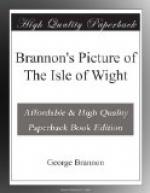The extensive downs of the island afford excellent pasture for sheep, whose wool is of a staple not inferior to that produced on the South Downs: and many thousand lambs are annually sent to the London markets. From the improvements effected in Husbandry, there are now nearly sufficient oxen reared and fatted for the use of the inhabitants, instead of the butchers going as formerly, to Salisbury, &c. for their cattle.
The demands of the dock-yards (both here and at Portsmouth,) have greatly thinned the timber of the island, which is principally oak and elm, and is found to grow most luxuriantly in the wooded tract from East Cowes to St. Helen’s.
In the time of King Charles II, woods were so extensive, that it is recorded, a squirrel might have run on the tops of the trees from Gurnard to Carisbrooke, and in several other parts for leagues together.
* * * * *
In ZOOLOGY there is nothing very remarkable, except the absence of pole-cats, badgers, and till lately, even foxes: but the poultry-breeders are now indebted for the introduction of the latter to some sparkish amateurs of hunting: many have been killed, but they are still breeding rapidly in the favorable fastnesses of the more rocky and woody districts. Otters too are frequently seen.—GAME is abundant, particular attention having been paid to its preservation. “The great plenty of hares and other game is owing to the care of Sir Edward Horsey, governor in 1582, who is reported to have given a lamb for every living hare brought to him from the neighbouring counties.”
THE NIGHTINGALE.—These much-prized birds of passage make the island their early and most favorite resort; and to those visitors from the north who perhaps never heard their unrivaled notes, the opportunity would prove not the least gratifying circumstance in a day’s pleasure. On fine evenings in the months of May and June, the woods and groves in every direction resound with the delightful chorus of their inimitable songs.
Astonishing numbers of sea-fowl resort during the summer months to the cliff’s of Freshwater and Bembridge: in the latter, the eagle has been known to build its eyry, and in the time of queen Elizabeth they were famous for a breed of hawks, which were so valued, that it was made a capital crime to steal them.
FISH of every kind common to the southern coast of England is caught off the island, but not in that abundance which might be expected, except crabs and lobsters, which are uncommonly large and fine. Mackarel are some seasons extremely plentiful, small, but peculiarly sweet. Numbers of porpoises are seen rolling along in the Solent Sea and Southampton Water; sharks are frequently observed off the back of the island, and sometimes even the grampus pursuing its prey. In 1814, a large whale was taken off the Shingles (west of the Needle Rocks,) having been left aground by the ebbing tide: and in the winter of 1841, another, measuring 75 feet in length, was caught near the same spot.




